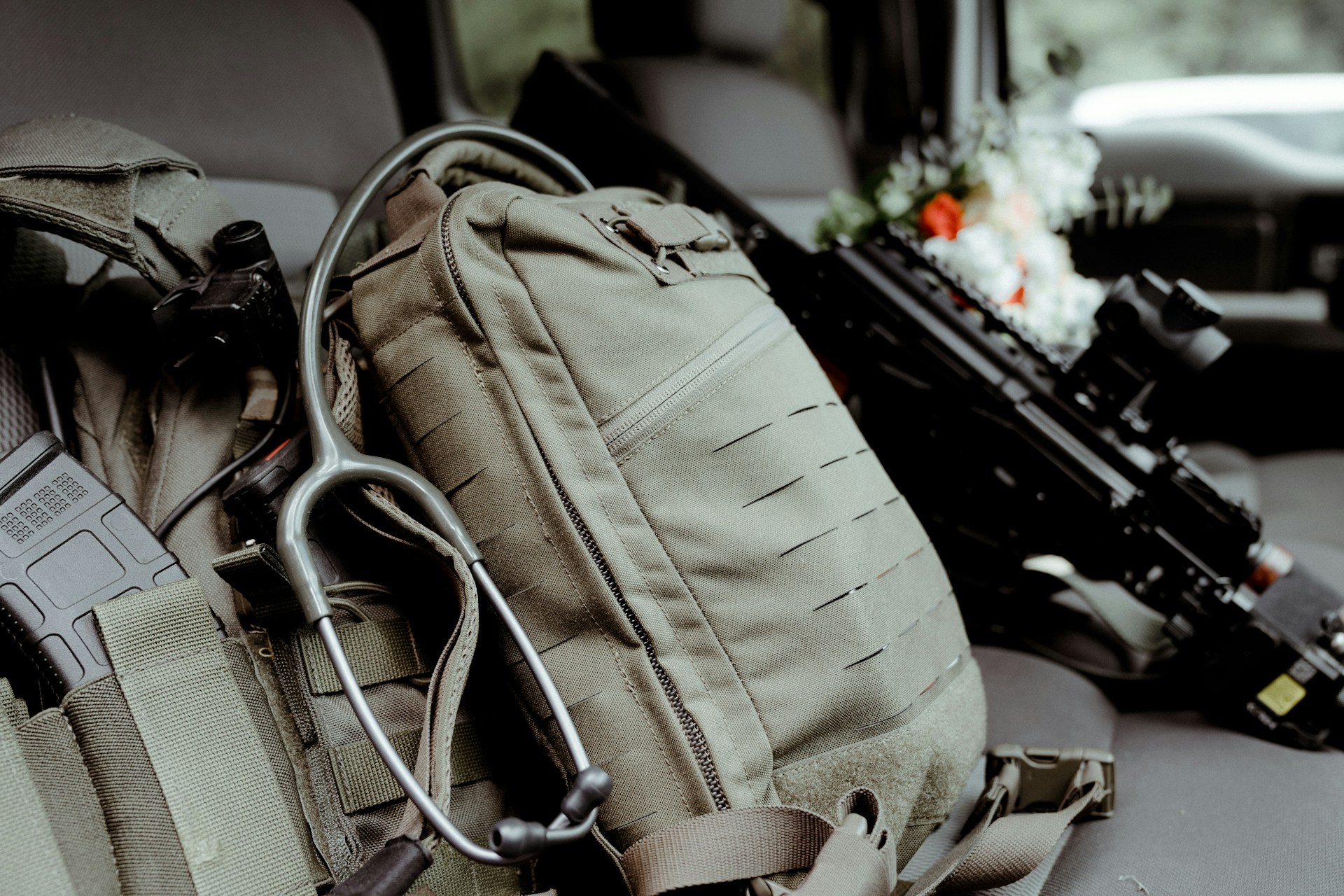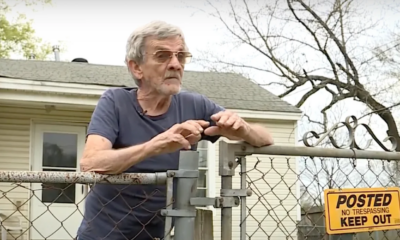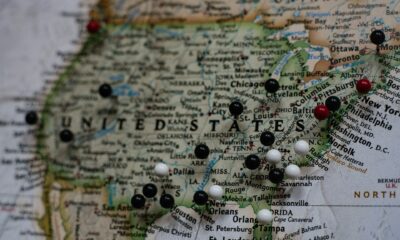Preparedness
Homeowner Jailed After Confronting Alleged Squatter in Her Home

A Georgia homeowner found herself in an unexpected legal predicament after confronting an alleged squatter in her property. Loletha Hale, who owns a house in Livingston, Georgia, had been dealing with a squatter situation since August, according to her account to WSB-TV. Despite her attempts to resolve the issue, it was Hale who ended up in jail.
Hale’s troubles began when she discovered Sakemeyia Johnson residing in her home with a former tenant. The tenant had previously been evicted, and Johnson initially received a citation for squatting. However, a court later ruled that “Sakemeyia Johnson is not a squatter,” despite Hale’s insistence that Johnson was never a tenant.
On December 9, Hale entered her house to prepare it for a new renter and encountered Johnson once more. Hale claimed that Johnson had “broken the locks” to gain access. She stated, “She just caught up out of nowhere. She had this guy with her, and I locked the door. I locked the screen door, and he forced himself in telling us to get out.”
Despite Hale’s efforts to have Johnson charged with trespassing, it was Hale who was arrested. Police body cam footage captured an officer explaining to Hale that not everyone is as fortunate as she is, saying, “Everybody isn’t as fortunate as you to have a bed.”
Johnson, on the other hand, maintained, “I was written a citation saying I was a squatter. But a judge signed an order saying that I wasn’t a squatter.” The police arrested Hale on charges of executing an illegal eviction and making terroristic threats, as she was heard saying, “leave before I get my gun.”
Hale expressed her disbelief at the situation, stating, “To see that woman walk into my mom’s house while I was in the police car, something is wrong with this picture. Something is inherently wrong with this picture.” She also questioned, “How can she not be squatting when I’ve never had any type of contract relationship with this person.”
Reflecting on her arrest, Hale described the experience as humiliating, saying, “I spent the night on a mat on a concrete floor in deplorable conditions. While this woman, this squatter slept in my home.” She is uncertain when she will be able to return to her property, as she awaits a hearing for Johnson’s appeal, despite Johnson not meeting the statutory requirements for one.
Hale remains in a state of limbo, unsure of when she will regain access to her home, and continues to seek legal resolution to the situation.
Watch a local news report about the incident below:
Let us know what you think, please share your thoughts in the comments below.

Preparedness
Survival in a Changing America: Why Preparedness Matters More Than Ever

Survival isn’t just about wilderness skills or stockpiling food. In today’s America, survival means being ready — financially, mentally, and physically — for rapid change. Under President Trump’s current term, the country is moving fast. Supporters see decisive leadership, tougher borders, economic nationalism, and a renewed focus on American strength. But with that speed comes disruption, resistance, and uncertainty. That’s where personal preparedness comes in.
President Trump has made it clear he believes in self-reliance, national security, and strength over dependence. Those same principles apply at the household level. Whether it’s supply chain pressure, political unrest, inflation, or grid stress, Americans who prepare are simply harder to shake.
1. Control What You Can Control
Trump’s presidency has emphasized America first — but that mindset starts at home. You may not control Congress, global markets, or activist judges, but you can control your food, water, cash reserves, and personal security. A prepared household is less vulnerable to sudden price spikes, shortages, or emergencies caused by political or economic battles in Washington.
Stocking basic food, having backup power, and keeping cash on hand isn’t paranoia — it’s responsibility.
2. Supply Chains Are Still Fragile
Despite economic growth claims and lower energy prices in some areas, grocery costs and essentials remain unpredictable. Trump’s push for tariffs and reshoring manufacturing is aimed at long-term strength, but transitions aren’t painless. Short-term disruptions happen before long-term gains materialize.
Smart Americans don’t wait for headlines to confirm trouble. They quietly build buffers: extra food, household necessities, and alternative sourcing.
3. Civil Unrest Isn’t Going Away
Trump’s presidency continues to expose deep political divides. Protests, counter-protests, and aggressive rhetoric aren’t disappearing — they’re becoming normalized. Survival today means knowing how to avoid trouble, not chase it.
Situational awareness, safe travel habits, and basic home security upgrades matter more now than they did a decade ago. Strong borders don’t eliminate internal instability overnight.
4. Medical and Personal Readiness Matter
Government systems get stressed during shutdowns, disasters, or mass events. Trump often criticizes bloated bureaucracy for a reason — it moves slowly when speed matters. Having basic medical supplies, prescriptions, and personal health plans ensures you don’t depend entirely on institutions that may lag when demand spikes.
Preparedness is independence.
5. Survival Is a Mindset, Not Fear
Trump supporters are often labeled “fearful,” yet preparedness is the opposite of fear. It’s confidence. It’s knowing that no matter what happens — politically, economically, or socially — your family is stable.
The core Trump message has always been strength, resilience, and refusing to be weak or dependent. Survival thinking aligns perfectly with that philosophy.
America is changing. Fast leadership brings fast reactions. The prepared citizen doesn’t panic, protest, or plead — they adapt.
Survival today isn’t about hiding from the future. It’s about being ready to face it head-on.
Preparedness
How U.S. Citizens Should Stay Safe When Traveling Abroad

Traveling internationally can be rewarding, but it also carries risks that vary widely by destination and situation. The U.S. government offers specific safety guidelines to help American travelers prepare, stay informed, and protect themselves throughout their trip.
Here are key practices U.S. citizens should follow to stay safe overseas:
1. Check Travel Advisories Before You Go
The U.S. Department of State issues travel advisories for every country. These advisories use a four-level system to show risk:
- Level 1: Exercise normal precautions
- Level 2: Exercise increased caution
- Level 3: Reconsider travel
- Level 4: Do not travel
Before booking or departing, always review the current advisory for your destination. Higher levels indicate serious risks like crime, civil unrest, terrorism, health emergencies, or limited emergency services.
2. Enroll in the Smart Traveler Enrollment Program (STEP)
Before departure, sign up for the Smart Traveler Enrollment Program (STEP). This free service connects you to the nearest U.S. embassy or consulate and keeps you informed with real-time updates about safety, weather, civil unrest, or health issues in your destination. It also makes it easier for authorities to contact you or your emergency contacts if needed.
3. Know Local Laws and Customs
U.S. citizens abroad must obey the laws of the country they are visiting. Local legal systems and penalties can differ significantly from those in the United States. Travelers should research local laws, dress codes, cultural norms, and any restricted activities before departure to avoid fines, detention, or legal complications.
4. Prepare Important Documents and Contacts
Carry your passport with you at all times and make digital copies of important documents like your passport page, travel insurance, and emergency contacts. Leave copies with someone at home and store them securely online. Keep local embassy contact information readily available in case you need assistance while abroad.
5. Have a Personal Emergency Plan
Emergencies can range from civil unrest and natural disasters to health crises and lost travel documents. Plan ahead:
- Know where the U.S. embassy or consulate is in your destination
- Have a communication plan with family or friends back home
- Know your travel insurance coverage and how to access medical care while abroad
- Understand evacuation routes and local emergency services
During a crisis, the U.S. government may not be able to evacuate you immediately. You should be ready to use commercial travel options to leave if it is safe to do so.
6. Stay Alert and Use Common Sense
Travel safety often comes down to ordinary precautions:
- Avoid risky areas and follow local authority instructions
- Keep a low profile and avoid displaying expensive items
- Be aware of your surroundings, especially in crowded or unfamiliar places
These practices reduce the chance of being targeted for theft or other crimes.
Why This Matters Today
Global travel risks can change quickly due to political tensions, health outbreaks, or civil unrest. For example, the U.S. government has issued worldwide travel caution alerts during periods of heightened international tension, underscoring the importance of staying updated with current risks.
Summary of Key Safety Steps
- Check official travel advisories for your destination
- Enroll in the Smart Traveler Enrollment Program (STEP)
- Know local laws and customs
- Carry and secure important travel documents
- Prepare a personal emergency plan
- Stay alert and cautious throughout your trip
Preparedness
5 Things You Need to Travel Across America Safely and Legally

Traveling across the United States is one of the great freedoms Americans enjoy. Whether you’re driving state to state, flying cross-country, or taking a long road trip, staying safe and fully within the law doesn’t require anything complicated. It just takes preparation, awareness, and a few essentials that every traveler should have in place before they go.
Here are five things you need to travel across America confidently, safely, and legally.
1. Valid Government-Issued Identification
This is non-negotiable.
A valid ID proves who you are and allows you to travel without unnecessary delays or problems.
For most people, this means:
- A valid driver’s license or REAL ID
- A state-issued ID card if you don’t drive
- A valid U.S. passport (especially useful for air travel)
If you’re flying, your ID must meet TSA requirements. If you’re driving, your license must be current and not suspended. Keep your ID easily accessible, but secure.
2. Proof of Legal Residency or Citizenship (If Applicable)
If you are a U.S. citizen, carrying proof such as a passport or passport card adds an extra layer of security during long trips, especially near border states or when flying.
If you are a legal resident or visa holder, you should always carry:
- Your valid visa or green card
- Any required travel documents associated with your status
Having proper documentation protects you from misunderstandings and unnecessary stress.
3. Proper Vehicle Documents (If Driving)
If you’re traveling by car, make sure your paperwork is up to date.
This includes:
- Vehicle registration
- Proof of insurance
- A valid driver’s license
Law enforcement checks are routine and usually brief when paperwork is in order. Keeping documents organized shows responsibility and helps everything go smoothly.
4. A Safe and Legal Travel Plan
You don’t need a strict itinerary, but you should know where you’re going and how you’ll get there.
A smart travel plan includes:
- Knowing your route and major stops
- Booking legal accommodations (hotels, campgrounds, or rentals)
- Understanding basic state laws (speed limits, phone use, toll roads)
Each state has its own rules, and being aware of them helps you avoid fines or problems.
5. Emergency Contacts and Communication
Safety isn’t just about laws — it’s about preparedness.
Carry a charged phone, a car charger or power bank, and a written list of emergency contacts in case technology fails.
It’s also wise to:
- Share your travel plans with someone you trust
- Check weather conditions regularly
- Keep emergency numbers saved and written down
Prepared travelers are calm travelers.
Final Thought
Traveling across America legally and safely doesn’t require fear or special permissions. It requires valid identification, proper documents, respect for local laws, and basic preparedness.
When you travel with everything in order, you’re free to enjoy the journey — not worry about it.
-

 Off The Grid4 months ago
Off The Grid4 months ago10 Foods That Could Save Your Life When Grocery Shelves Are Empty
-

 Tactical2 years ago
Tactical2 years ago70-Year-Old Fends Off Intruder with Lead-Powered Message
-

 Tactical2 years ago
Tactical2 years agoVape Shop Employee Confronts Armed Crooks, Sends Them Running
-

 Preparedness4 months ago
Preparedness4 months ago5 Things You Should Always Carry During a Winter Storm
-

 Nature and Wildlife4 months ago
Nature and Wildlife4 months ago10 Survival Skills You Should Learn Before You Need Them
-

 Preparedness2 years ago
Preparedness2 years agoEx-Ballerina’s Guilty Verdict Sends Tremors Through Gun-Owner Community
-

 Preparedness4 months ago
Preparedness4 months agoSmart Person’s Checklist: 10 Things You’ll Wish You Had When Disaster Strikes
-

 Preparedness9 months ago
Preparedness9 months agoDiscover Free Land in These Three Surprising States
William Powell
January 15, 2025 at 12:09 pm
The judge needs to be recalled and removed
EDWARD SOMERS
January 15, 2025 at 12:29 pm
I have heartburn when the law is interpreted in such a way as to allow a burglar to sue for medical treatment (remember that school roof skylight?) or a person can squat and assume more rights than the legitimate owner. I await the ruling from SCOTUS that a person (temporarily) forfeits their civil rights during the commission of a crime.
Don
January 16, 2025 at 3:06 pm
Adults have the right to throw the trash out when found and any city or state has the right to do anything to any homeowner that throws them out one way or another. Those doing so need to be the ones arrested and imprisoned for being so stupid.
Rick
January 15, 2025 at 12:30 pm
This is becoming a much larger issue and the courts being full of leftists siding with illegals and criminals and attacking legal homeowners must be stopped immediately when the legal owners are recognized without fail!!
Rush
January 15, 2025 at 2:11 pm
She had a perfect right to confront and remove the squatter with or without physical force, she has the right to protect herself and home using a weapon if necessary , the police needed to support the home owner 100%. America needs to stop all the BS of the liberal socialist democrats dangerous nonsense they have spread across the country for the past several years. It’s time to speak up loudly, strongly and powerfully to defend the citizens and the integrity of America.
Jtamad
January 15, 2025 at 2:57 pm
Criminals has more rights than law abiding citizens. Our country is in path to destructions.
Blue Moon
January 15, 2025 at 3:41 pm
The ATL police did NOT do their job. The homeowner Ms Hale, should not have been arrested, and the Officer
should have arrested the squatter for breaking the door lock and entering inside the home.
Did the Officer know the squatter or something?
Since when does a squatter have more rights than a homeowner who pays the taxes?
Hope this is resolved and the squatter legally gets what’s coming to her.
Jim
January 15, 2025 at 4:33 pm
She should have. The right to get the burglar out of her house. What king of bs is this.She should have the right to count to three to get the son out if her don’t leave she shoul have the right to use what ever force is needed to get the burglar out of her house including deadly force.
uncle albert
January 15, 2025 at 8:25 pm
The squatter is lucky it isn’t me in this situation…….
As soon as the cops left, there would be another “unsolvable death of a transient” for the paperwork empire to deal with.
Remember, a revolver doesn’t leave brass behind for evidence !
Redwolf
January 15, 2025 at 11:11 pm
I hope it never happens to me but if I ever catch a squatter in my home I’ll ask him/her to leave as politely as I possibly can. If they don’t leave or if they leave and then come back later I’ll kill them graveyard dead and leave them for the ants and buzzards. No questions asked, no mercy shown and no pity or pardon given.
jefz
January 16, 2025 at 12:14 pm
In far left liberal states/communities crime pays.
msgleo
January 16, 2025 at 1:11 pm
This is so dumb, the owner of the property should be able to say who lives and who doesn’t live in their own house. These liberals are so illogical when it comes to ownership. If someone squats they should be removed and ordered to pay rent for the time they were illegally in a house they did not own or rent.
M. Snow
January 16, 2025 at 8:39 pm
Agreed
Paul
January 17, 2025 at 4:01 am
they break into a house to rob it. The owner should of had the right to defend their property.
CPO Bill
January 17, 2025 at 2:45 pm
If i get one Mr. Remington 12 ga will escort it out to the street!